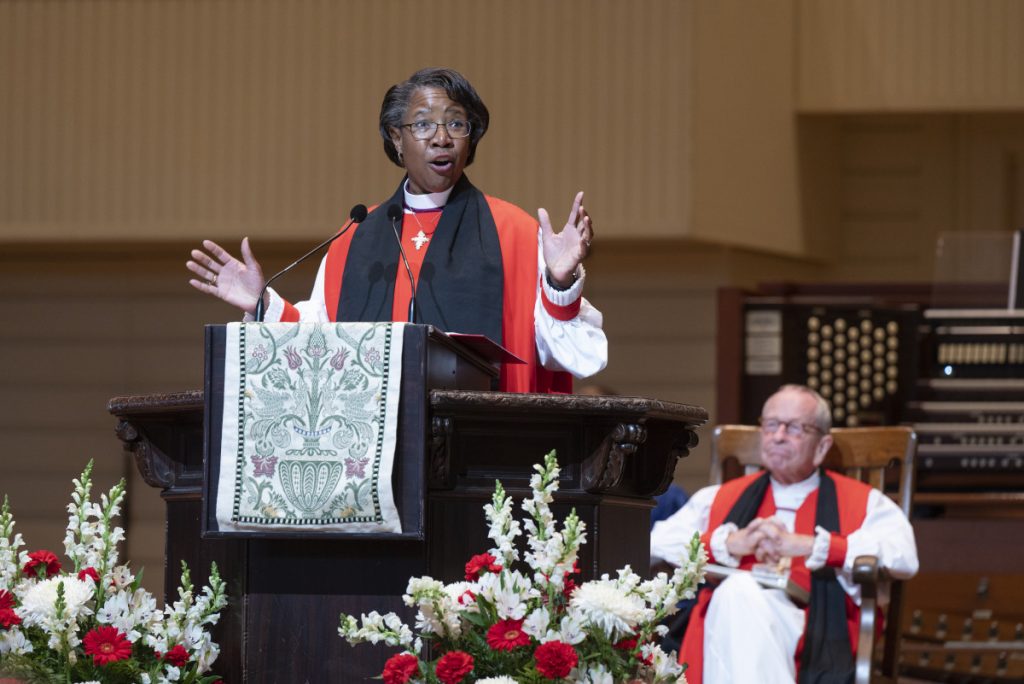MARY LEE TALBOT – STAFF WRITER

“I was ordained 24 years ago, and I often reflect on the fact that the church then is not the church of today. It is a different world, after all,” said the Rt. Rev. Jennifer Baskerville-Burrows. “I went from Berkeley, California, to upstate New York with all kinds of ideas on how to do things. I was blessed with a congregation that had patience, and gave me the space to try and fail.”
Baskerville-Burrows preached at the 9 a.m. morning worship service Monday in the Amphitheater. Her sermon title was “Seriously? Do you not understand?” The Scripture reading was Mark 4:1-20.
In her ministry, Baskerville-Burrows moved from that first small congregation to a larger one with money and staff, then back to Berkeley to raise money and mentor students, and then to Syracuse, New York, as a half-time rector and half-time chaplain at Syracuse University.
“People wondered why I was leaving California for Syracuse,” said Baskerville-Burrows, “but what better than to go to a congregation that was racially diverse and had been active in the civil rights movement and the women’s ordination fight in the Episcopal Church, and is involved in the LGBTQ struggle?”
There was no staff and only a volunteer secretary. Eventually the church could afford a secretary for eight hours a week. “There were few young people,” said Baskerville-Burrows, “but the congregation had big ideas for growing in faithfulness and numbers.”
However, new people and programs led to conflict in the congregation. “Like most of us, I was not in the habit of really listening,” Baskerville-Burrows told the congregation. “The elders who made the church what it is had stories that were the theological groundwork for their works of justice. They were growing frail, but they had deep wisdom that needed to be heard. When we started to listen, we all flourished.”
Jesus, she said, used the command to listen over and over in Mark’s gospel. The Parable of the Sower is the first parable in Mark’s gospel. “I have wrestled with it for decades. What is the soil, the path, the word, the weeds? Is the church the good soil? Are the greedy self-interested people really the rocky soil?”
Jesus told the Parable of the Sower to the crowd and said to them, “Let those who have ears to hear, hear.” When Jesus gathered the disciples together afterward, he was talking to those on the inside, who should have the ability to understand.
“The ability to understand was the secret given to those on the inside. For those outside, everything was oblique and never changed,” Baskerville-Burrows said. “Jesus could see the questions on the disciples’ faces and he said, ‘Seriously? Do you not understand?’ ”
Jesus broke open the story for them and made the meaning plain to the disciples. “He wants them — and us — to be about attentive listening and deep curiosity,” she said. “From Chapter 1 in Mark, the message is pay attention, the kingdom has come near. Watch, listen, turn around; and believe in healing, reconciling good news right here and now.”
She continued, “The church in Syracuse was a master class in listening. There was no going forward until all the stories were lifted up and we listened to one another with intention and attention. People held painful stories of segregation, and they would tell them if others would listen. The stories ignited the faith of the college students, and they could celebrate the overcoming and perseverance.”
The congregation heard stories about bomb threats on the church during the civil rights movement and picketing in opposition to the ordination of women. “The stories let the students know that if they made it and lived to tell the tale, then we can, too,” Baskerville-Burrows said.
Jesus asked the disciples to really hear the Parable of the Sower. “There may be insiders in the church, society, corporations — but they are not inside in a way that counts,” she said. “When you ask yourself, ‘How did we get here, in the world as it is today?’ Jesus asks, ‘Seriously? Do you not understand?’ Listen.”
The Rt. Rev. V. Gene Robinson, vice president of religion and senior pastor at Chautauqua Institution, presided. The Rev. Natalie Hanson, co-host of the United Methodist Missionary Vacation Home at Chautauqua, read the Scripture. Joshua Stafford, who holds the Jared Jacobsen Chair for the Organist and is director of sacred music, played “Prelude on St. Flavian,” by T. Frederick H. Candlyn, for the prelude. Members of the Motet Choir sang “Come and Seek the Ways of Wisdom,” with music by David Hurd and words by Ruth Duck. The postlude was “Tuba Tune” by Craig S. Lang. The J. Everett Hall Memorial Chaplaincy and the Harold F. Reed Sr. Chaplaincy provide support for this week’s services and chaplain.




